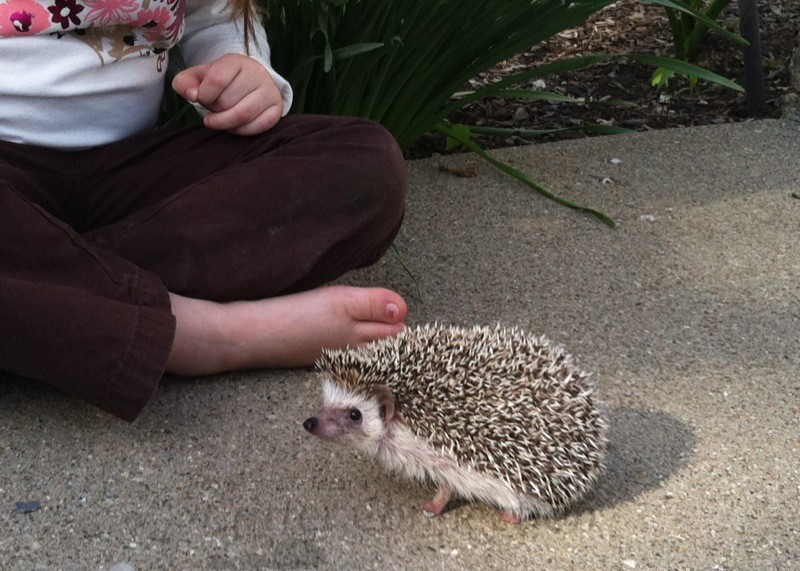Last Updated on October 19, 2022.
Benefits
- Animal enthusiasts often want to give their pets time outdoors when the weather is right. We like to be outdoors ourselves, so it is logical to think that our hedgehogs would like to catch some fresh air as well.
- Hedgehogs generally love exploring grass, leaves, and a new environment.
- As long as you take certain precautions, your hedgehog may enjoy a change in scenery.
- Remember that hedgehogs may self anoint with new scents or substances they come in contact with. Typically safe, but can be very messy!
Weather Conditions and Time of Day
- You will want to make sure the weather is suitable for your hedgehogs.
- Most hedgehog enthusiasts recommend a minimum outdoor temperature of 70-72 degrees Fahrenheit and that the ground is warm. The first of spring the grass, concrete etc. may not be as warm as the outdoor temperatures.
- Make sure your deck, patio, or other concrete isn’t too hot from the heat of the sun. Check the temperature with your bare feet or hands because if the temperature is too warm or hot for you it will certainly be too hot for your hedgehog.
- The difference in light from indoors to outdoors may stress your hedgehog so pay close attention for signs of stress.
- Make sure your hedgehog is not exposed to direct sun or extremely high temperatures so evening and night time hours are often better than the heat of the day.
- Some hedgehogs may prefer to be outdoors in the evening when the light and temperature is less stressful for them.
Supervision
- Always keep an eye on your hedgehog whether in an enclosure or free ranging with you.
- Hedgehogs can be quite the sneaky and opportunistic escape artists the moment your attention is directed elsewhere.
- Danger could come from other animals as a hawk, eagle, dogs, or other hungry creature could snatch your hedgehog.
- According to Z.G. Standing Bear “Unfamiliar with the spines of a hedgehog, a large bird may snatch up a hedgehog as s/he would a rabbit and may even give up on the project in route, only to drop the hedgehog several hundred feet to the ground”.
In an Enclosure
- We suggest keeping your hedgehog in a protected, enclosed area where you can monitor and supervise your hedgehog’s activity at all times.
- Make sure there is no place to burrow or any potential escape routes. Hedgehogs are fast compared to other animals so it is easy for us to let our guard down and not pay attention to their wanderings.
- Unless you are very close to your hedgehog it is a good idea to have a secure lid on your outdoor enclosure.
VIDEO.: Simple Hedgehog Playpen
Parasites and Pesticides
- Some hedgehog owners choose to let their hedgehogs explore the grass.
- Always make sure the grass has not been treated with any chemicals and is free from fecal matter of other animals.
- Hedgehogs naturally self anoint with new scents and there are things in the outdoors that can be harmful to hedgehogs.
- Outdoor insects may be a tasty treat for your hedgehog but they can pick up parasites, pathogens or toxins from things in their environment.
- It is a good idea to have your veterinarian check a fecal sample for parasites at the end of the summer if your hedgehog has played outdoors.
- Parasites can be treated but you have to decide if the benefits outweigh the risks.
- Many hedgehog owners choose not to allow their pets to explore the grass because the risks can surpass the benefits.
VIDEO.: https://youtu.be/QsyfHkKwHk8
Swimming
- Hedgehogs are good swimmers but it is never a good idea for them to swim in a pool or pond.
- You may want to provide a shallow pan with water (1”-2”), so your hedgehog can play in it if he desires. Again, you will need to watch and be sure he can enter and exit on his own without assistance, and you should never leave him unattended.
Contributor: Gail Smith, Susan Crocker; Susan’s Hawkeye Hedgies, Melissa Ramos






